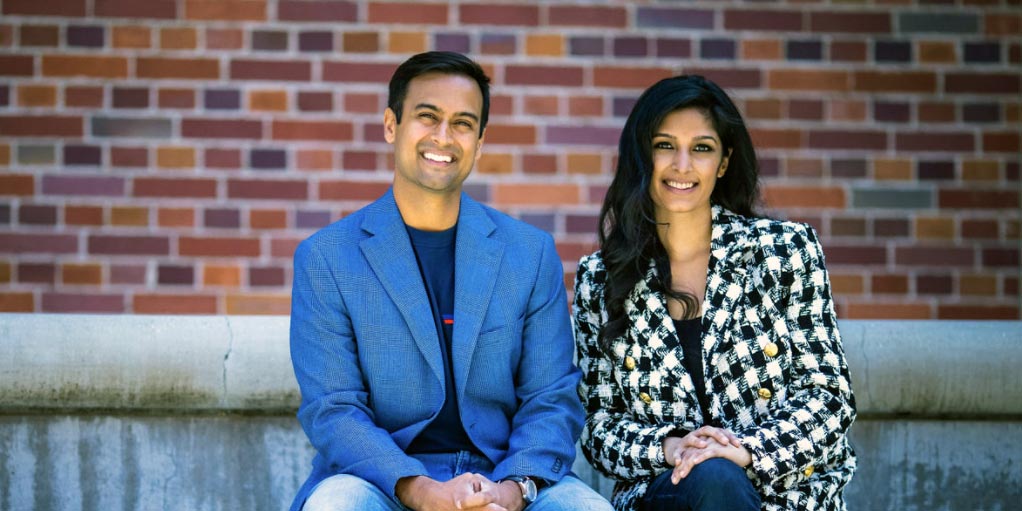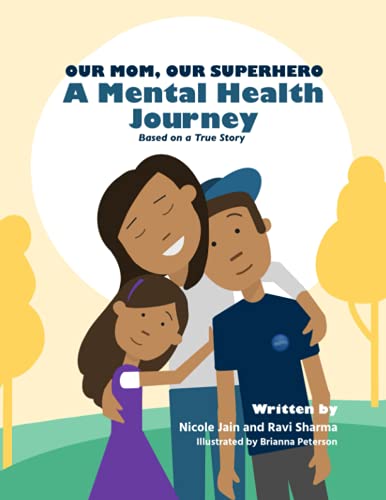
Nicole Jain and her brother, Ravi Sharma.
For Nicole Jain, Ed.M.’11, the children’s book she recently published is the kind of book that would have been helpful when she was a girl. Our Mom, Our Superhero, co-authored with her brother Ravi is about the experience of two young siblings trying to help their mother deal with mental illness. It’s based on the experience the pair had with their own mom. Jain spoke about the book.
What’s the goal of Our Mom, Our Superhero?
Nicole Jain: To help children understand the importance of personal mental health from a young age while being able to understand, recognize, and help those in their lives with mental illness. In this story, the mother struggles with depression, causing her to have difficulties managing her home and work life. Her children begin to see a change in their mother and are left to navigate the healthcare system to find her the appropriate resources and care. Further, the story of the daughter/sister Mya falling and scraping her knee requiring medical treatment is meant to help children understand the similarities between physical and mental health.
This is personal for you.
Nicole Jain: Yes, my brother and I experienced a similar journey as children trying to help our mother who was suffering from depression.
What role did stigma play?
Nicole Jain: Within our South Asian community, there has always been a lot of stigma surrounding mental illness, especially 20 years ago. As a first generation South Asian, we were brought up in a suburb that actually had quite a few South Asians within our community. After seeking help for our mother, we were isolated from the community, received no help, and were left to navigate the convoluted process alone. In the book, you will find that “we” sought help and, more specifically, reached out to our aunt. She did not help us and provided no support or adult guidance. We were left to navigate the different mental health resources available including therapy, medicine management, etc. It would have been helpful for there to have been a support group for moms who are south asian and struggling with their mental health and happy that there are so many more resources today!
Within our South Asian community, there has always been a lot of stigma surrounding mental illness, especially 20 years ago . . . I am happy that there are so many more resources today!
What made you want to turn your experience into a book for kids?
Nicole Jain: The idea actually arose after my brother started OOTify, a digital, research-backed mental health company that gathers and provides customized mental health resources and services. His company not only provides customized support for enterprises like hospitals and nonprofits, but also assists college students who are in need of mental health resources. Through the startup process, we began to recall our family’s experiences with mental illness and realized how valuable an earlier introduction to mental health as children would have been.
Are there other books like yours?
Nicole Jain: There are other children’s books out there discussing mental health but none that focus on the child’s perspective while educating children on specific mental health terms and topics.
There are other children’s books out there discussing mental health but none that focus on the child’s perspective while educating children on specific mental health terms and topics.
The book is based in research, which is why you include definitions, correct?
Nicole Jain: Yes, this book is not just based on anecdotal experiences. We worked closely with doctors, psychologists, parents, therapists, and teachers to put together a list of definitions that easily explain central mental health topics. This includes words like “support group,” “stigma,” and “psychiatrist.”
You’re working with teachers?
Nicole Jain: We have partnered with the University of Southern California (USC) and the USC Joint Educational Project to provide lesson plans. Through these partnerships, we will work with teachers and train tutors to implement several interactive lessons that go along with the book for underprivileged students within the communities surrounding the campus.
You’re currently director of strategy at OOTify, but previously worked in schools?
Nicole Jain: Yes. I worked on the policy teams at Chicago Public Schools as well as the Los Angeles Unified School District.
Ultimately, you and your brother were able to help your mother.
Nicole Jain: Yes. We were able to secure therapy, medical management, and lifestyle support (sleep hygiene, routines, and better nutrition), which have successfully helped our mother remain in remission for many years.
This article by Lory Hough originally appeared in Harvard Ed. Magazine

